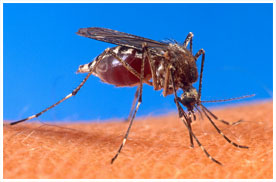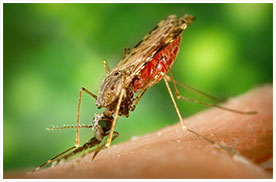
Dengue, a mosquito-borne disease, is the 10th leading cause of sickness in the Philippines in the last 5 years. Caused by any one of four closely related viruses, a severe form of this disease, called dengue hemorrhagic fever, is potentially fatal if unrecognized & not properly treated in a timely manner.
Symptoms of dengue are high fever, severe headache, severe pain behind the eyes, joint pain, muscle & bone pain, rash, & mild bleeding (e.g., nose or gums bleed, easy bruising). More about dengue symptoms
Combat the mosquito through environmental management by eliminating the places where the mosquito lays her eggs, or eliminating other items that contain water. Use repellent on your skin while outdoors & indoors, or wear long sleeves & pants for additional protection.More about Dengue prevention here
Do not give aspirin to a person who may have dengue. Give plenty of water to drink. When he or she experiences danger signs like spontaneous bleeding or difficulty of breathing, bring the patient to the hospital immediately

Malaria is a serious & sometimes fatal disease caused by a parasite that is commonly transmitted by a female Anopheles mosquito when it feeds on humans. If not promptly treated, the infection can become severe and may cause kidney failure, seizures, mental confusion, coma, and death.
Malaria is the 9th leading cause of sickness in the Philippines. Find out how many have been affected:
Symptoms of malaria include fever and flu-like illness, including shaking chills, headache, muscle aches, and tiredness. Nausea, vomiting, and diarrhea may also occur. More on symptoms & diagnosis hereIf you live in an area where Malaria is a problem, prevent mosquitoes from biting you, especially at night, by using insect repellent & wearing long-sleeved clothing if out of doors at night. Sleeping under mosquito nets treated with insecticide also help. Helping control potential mosquito breeding grounds also help.
There is currently no malaria vaccine approved for human use. However, anti-malarial medicines responsive to the specific form of malaria in the blood help eliminate the disease.
Leptospirosis is caused by bacteria of the genus Leptospira. It exists in several 'reservoir' species, most commonly in rats, and is usually spread by the urine of a carrier animal entering water or food stores. Without treatment, it can lead to kidney damage, meningitis, liver failure, respiratory distress, and even death.
The bacteria is not airborne. A person can get sick by swallowing the bacteria directly from water, absorbing it through cuts in the skin, or via food. More about leptospirosis
A person may get sick within 2 days to 4 weeks from the time of exposure to a contaminated source, such as floodwater. Illness usually begins abruptly with fever, chills, headache, muscle aches, vomiting, or diarrhea and other symptoms. More about symptoms.
To reduce risk, anyone working in or is exposed to flood water should protect any broken skin with waterproof dressing a and should ensure that they do not allow potentially contaminated water to enter their mouth. More on preventing leptospirosis
Leptospirosis is treated with antibiotics, such as doxycycline, which should be given early in the course of the disease. The health department stresses, however, that one must see a doctor when symptoms manifest because there is no 100 % guarantee that the treatment will be effective. Read more
Cholera is an acute, diarrheal illness caused by infection of the intestine with the bacterium Vibrio cholerae. The bacteria is usually found and spread in places with inadequate water treatment, poor sanitation, and inadequate hygiene. Rapid loss of body fluids due to Cholera leads to dehydration and shock. Without treatment, death can occur within hours. More about Cholera
Approximately one in 20 (5%) infected persons will have severe disease characterized by profuse watery diarrhea (stool can look like cloudy rice water), vomiting, and leg cramps. Cholera is confirmed through culture of a stool specimen or rectal swab. More
The best way to combat cholera is through proper sanitation, good hygiene and proper handling of food. If you are unsure if your water source is safe, bring the water to a complete boil for at least 1 minute before drinking. More
The primary goal of treatment of cholera is prompt restoration of lost fluids and salts through rehydration therapy. This is typically done through the administration of oral rehydration salts and, when necessary, intravenous fluids and electrolytes. More on treatment here
- Government hospitals
- Private hospitals